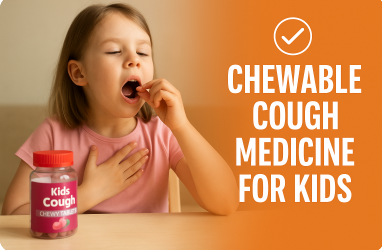Introduction
Coughing in children is one of the most common symptoms that can leave parents feeling helpless. Whether it’s caused by a cold, flu, or allergies, finding a remedy that your child will willingly take is often a struggle. This is where chewable cough medicine for kids becomes a game-changer.
These convenient, easy-to-take tablets are specifically designed to be safe and effective for children, helping to relieve symptoms without the fuss of liquid syrups.
Understanding Cough in Children
A cough is the body’s natural defense mechanism to clear airways of mucus, irritants, or infection. While a cough is usually harmless and self-limiting, it can be distressing for both kids and parents, especially when it interferes with sleep or school activities.
Common causes of cough in children include:
- Viral infections like the common cold or flu
- Allergies to dust, pollen, or pet dander
- Asthma or reactive airway disease
- Postnasal drip
- Exposure to smoke or pollutants
If a child’s cough persists for more than 10 days, is accompanied by a high fever, difficulty breathing, or wheezing, medical advice should be sought promptly.
Chewable Cough Medicines: An Overview
Chewable cough medicine for kids offers an innovative way to treat respiratory discomfort. Unlike traditional liquid syrups that some children resist due to taste or texture, chewables are often fruit-flavored and easier for young children to accept.
These medicines come in tablet or gummy form and are pre-measured for accurate dosing. They’re also portable and mess-free, which makes them ideal for travel or school use.
Benefits of Chewable Cough Medicine for Kids:
- No Spills or Measuring Required – Ready-to-use and convenient.
- Child-Friendly Flavors – Often available in grape, cherry, or berry flavors.
- More Acceptable to Picky Eaters – Especially helpful for kids who gag on liquid medication.
- Travel-Friendly – Easily packed in lunch boxes or travel bags.
Popular Chewable Cough Medicines for Kids
Several products on the market offer chewable relief from cough symptoms. Below is a table comparing some of the most well-known options:
| Brand Name | Active Ingredients | Age Recommendation | Flavor | Unique Features |
|---|---|---|---|---|
| Mucinex Children’s Mighty Chews | Dextromethorphan, Guaifenesin | 4 years and up | Berry | Expectorant and cough suppressant |
| Dimetapp Children’s Cold & Allergy | Diphenhydramine HCl | 6 years and up | Grape | Antihistamine for allergies + cough |
| Nature’s Way Umcka ColdCare | Pelargonium sidoides extract | 6 years and up | Cherry | Homeopathic, immune-boosting |
| Boiron Chestal Kids Pellets | Homeopathic blend | 2 years and up | Sweet melt | Natural ingredients, lactose-free |
Active Ingredients Explained
Understanding what’s inside your child’s medication is crucial for safe and effective treatment. Here’s a look at some common active ingredients found in chewable cough medicine for kids:
- Dextromethorphan HBr: A widely used cough suppressant that reduces the urge to cough by acting on the brain’s cough center.
- Guaifenesin: An expectorant that helps thin and loosen mucus in the airways.
- Diphenhydramine HCl: An antihistamine that can help reduce coughing caused by allergies or postnasal drip.
- Pelargonium sidoides: A natural extract used in homeopathic remedies believed to shorten the duration of colds.
- Honey & Ivy Leaf Extract: These are commonly used in natural or herbal products for their soothing and anti-inflammatory properties.
Safety Guidelines and Precautions
While chewable cough medicines are designed to be safe, they should always be used with care. Here are key guidelines to follow:
Age-Specific Usage:
- Children under 2: Avoid OTC cough medicines unless prescribed.
- 2–4 years: Use only under pediatric supervision.
- 4–6 years: Chewable forms may be introduced with caution.
- 6+ years: Generally safe to use chewable cough medicine as directed.
Precautions:
- Always follow dosing instructions on the label.
- Never combine multiple medications containing the same ingredients.
- Store medicines out of children’s reach.
- Watch for potential allergic reactions or side effects like drowsiness or upset stomach.
Natural Alternatives to Chewable Cough Medicines
For parents who prefer non-medicated options or want to supplement treatment, here are safe and effective natural remedies for children’s cough:
- Honey – For children over one year, honey can coat the throat and ease coughing. Mix 1 tsp with warm water or herbal tea.
- Steam Therapy – Sitting in a bathroom with a warm shower running can loosen mucus.
- Saline Nasal Spray – Helps clear nasal passages, reducing postnasal drip.
- Hydration – Water, warm soups, and electrolyte drinks soothe the throat and thin mucus.
- Cool-Mist Humidifier – Keeps air moist, especially during dry seasons, reducing nighttime coughing.
Consulting Healthcare Professionals
While many cases of cough are minor and manageable at home, some signs warrant medical evaluation. You should consult a pediatrician if:
- The cough lasts more than 10 days
- There’s wheezing or shortness of breath
- Your child is under 2 and coughing persistently
- Coughing is accompanied by high fever or vomiting
Pediatricians can help diagnose the underlying cause and recommend appropriate chewable or alternative medicines.
Conclusion
Choosing the right chewable cough medicine for kids can make all the difference in your child’s recovery and comfort. With various formulations designed to be both effective and kid-friendly, chewables offer a safe, mess-free alternative to liquid syrups.
Whether you opt for over-the-counter options like Mucinex Mighty Chews or natural remedies like honey, the most important thing is ensuring your child is safe, hydrated, and well-rested. Always consult your pediatrician when in doubt, and never administer medication intended for adults to children.
Related Articles
Lower Stomach Pain After Coughing: Causes, Treatment, and Prevention Guide
Are Halls Cough Drops Gluten Free? Detailed Guide for Gluten-Sensitive Consumers
Do Cough Drops Have Calories? | Full Guide on Calories in Cough Drops
When I Cough Pain in Lower Abdomen – Causes, Symptoms, Diagnosis & Treatment Explained

